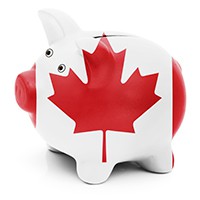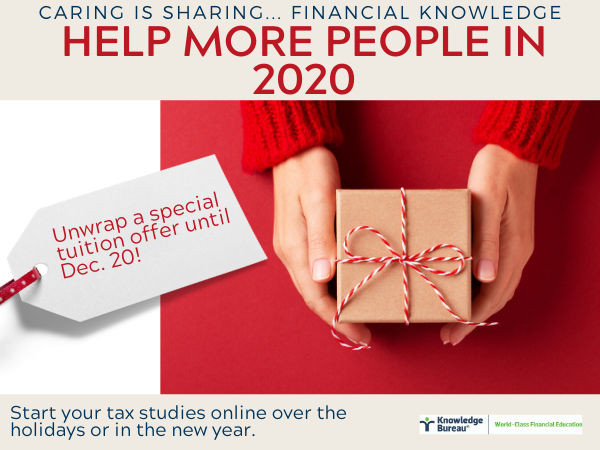Budgeting and Debt Management Tips for Canadians

Are you tightening your belt on holiday spending. . .or will there be a lot more than a lump of coal in your Christmas stockings this year? There are few things worse than having bills come due without money in the bank to cover them. But, for far too many Canadians, it is a reality more often than we would like to admit. That’s why Advisorsavvy has put together a list of budgeting and debt management tips for us to share with you.
As excerpted from the Advisorsavvy blog. Caring is Sharing Financial Knowledge; it’s our December theme here at Knowledge Bureau, so please, share these tips with your clients to help them improve their financial literacy and budgeting skills in the new year:
What is budgeting? At its core, budgeting is the creation of a financial plan. But it’s more than just a plan. It is about looking at your overall income, your fixed expenses and your variable expenses. Then, creating a way to ensure you have enough money to live while saving for a rainy day and the future.
Why is budgeting important? Having and maintaining good credit is vital qualifying for loans and mortgages. To get good credit, you need to use, maintain and pay off credit debt. In other words, you need to buy stuff. It might seem a bit backwards but yes, you need to spend to get credit and you need money to give you buying power. How do you do that? By budgeting – making sure you aren’t spending that which you don’t have.
If you budget properly, money should always be available to pay bills. Quality budgeting will have you covered, even if an unexpected, significant expense occurs.
- Having an emergency fund - This is one of the most important budgeting tips for Canadians. A very valuable way to avoid racking up debt and blowing your budget is to ensure you have a solid emergency fund. Your emergency fund should have money going into regularly to make sure you have a buffer should something happen. Even a well-managed budget can take a serious hit if you have unexpected expenses. You could be one car accident, roof repair or medical expense away from your budget going off the rails. Ensuring your emergency fund is well padded at all times will ensure your budget can absorb a bill payment you did not expect. A complete budget must include an
 emergency fund.
emergency fund.
- Know what you’re spending - You can’t budget if you don’t know where your money is going. So many of us blindly pay for things by credit card and throw money on it every month. That’s the best way to get in over your head and spend money you don’t have. Track what you’re spending and review your bank accounts and credit card statements, regularly.
- List your spending and income - Look over your paycheque and the bills you’ve paid, and the receipts for all of your purchases and put them in a spreadsheet. The final tally of income versus money out will show you if you’re in the black or the red. If you’re swimming in the red, it’s time to look at what you can reasonably cut to get back in the black.
- Create a balanced budget - Once you’ve written it all out and can see where you’re overspending, you’ll be able to sit down and create a budget that makes sense for you. That might well mean cutting back on lifestyle choices that have become habits; fewer restaurant dinners or vacations, for example. Laying out wants and needs and budgeting accordingly will help keep your finances flowing in a healthy way.
- The 50/20/30 rule - This method of savings was popularized in the United States but is absolutely applicable here in Canada. Breaking up your expenses into wants, needs and savings is the best way to layout where your money should go. Fifty percent of each paycheque should be able to go to needs. Needs include groceries, housing and utilities. We’d also consider your vehicle under the needs category because you have to be able to go buy the groceries and get to work! Only 30 percent of your pay should go to your wants. Wants include most everything else, like entertainment, shopping and any hobbies you might have. Savings are vital to budgeting. All of the budgeting in the world won’t matter if you don’t have money set aside for a rainy day. Twenty percent of your paycheque should go to savings, both accessible and long-term for retirement.
- Cut unused services - Got a gym membership but never go? It might be time to quit. The same is true for any other subscription services you might not use, like magazines or even meal planning kits you don’t really need.
- Forget the Joneses - Give up on keeping up with the Joneses. It’s amazing they took the family to Bermuda. But either they saved up, make a good income, or they went into debt to take that trip. You don’t know and they might not be the best budgeters to emulate.
Budgeting is one of those things where, once you’ve done it, you’ll wonder why you waited so long. Simply follow these budgeting tips and create a guide on how you can spend your money so that you can live your life, and still be protected in the future.
Additional educational resources: To learn more about helping Canadians with budgeting and effective use of debt in the Debt and Cash Flow Management certificate course.
Graduates of this course will have the ability to help their clients by doing a formal financial assessment at least annually. Families will better understand the effect of debt on their cash flow and ultimately their ability to accumulate wealth for the future by understanding their debt. You'll be able to help clients determine what is affordable, how much is affordable and what to do when it’s unaffordable: define an order of debt reduction. As well, the debt to asset ratio, debt to disposable income ratio and debt to equity ratio will be demonstrated and you'll learn what good debt and bad debt are and how to consolidate debt effectively.
COPYRIGHT OWNED BY KNOWLEDGE BUREAU INC., 2019.
UNAUTHORIZED REPRODUCTION, IN WHOLE OR IN PART, IS PROHIBITED.